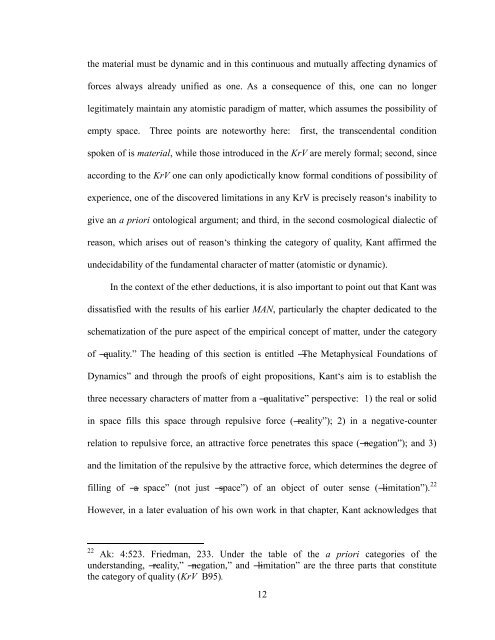The Doctrine of Self-positing and Receptivity in Kant's Late ...
The Doctrine of Self-positing and Receptivity in Kant's Late ...
The Doctrine of Self-positing and Receptivity in Kant's Late ...
You also want an ePaper? Increase the reach of your titles
YUMPU automatically turns print PDFs into web optimized ePapers that Google loves.
the material must be dynamic <strong>and</strong> <strong>in</strong> this cont<strong>in</strong>uous <strong>and</strong> mutually affect<strong>in</strong>g dynamics <strong>of</strong><br />
forces always already unified as one. As a consequence <strong>of</strong> this, one can no longer<br />
legitimately ma<strong>in</strong>ta<strong>in</strong> any atomistic paradigm <strong>of</strong> matter, which assumes the possibility <strong>of</strong><br />
empty space. Three po<strong>in</strong>ts are noteworthy here: first, the transcendental condition<br />
spoken <strong>of</strong> is material, while those <strong>in</strong>troduced <strong>in</strong> the KrV are merely formal; second, s<strong>in</strong>ce<br />
accord<strong>in</strong>g to the KrV one can only apodictically know formal conditions <strong>of</strong> possibility <strong>of</strong><br />
experience, one <strong>of</strong> the discovered limitations <strong>in</strong> any KrV is precisely reason‘s <strong>in</strong>ability to<br />
give an a priori ontological argument; <strong>and</strong> third, <strong>in</strong> the second cosmological dialectic <strong>of</strong><br />
reason, which arises out <strong>of</strong> reason‘s th<strong>in</strong>k<strong>in</strong>g the category <strong>of</strong> quality, Kant affirmed the<br />
undecidability <strong>of</strong> the fundamental character <strong>of</strong> matter (atomistic or dynamic).<br />
In the context <strong>of</strong> the ether deductions, it is also important to po<strong>in</strong>t out that Kant was<br />
dissatisfied with the results <strong>of</strong> his earlier MAN, particularly the chapter dedicated to the<br />
schematization <strong>of</strong> the pure aspect <strong>of</strong> the empirical concept <strong>of</strong> matter, under the category<br />
<strong>of</strong> ―quality.‖ <strong>The</strong> head<strong>in</strong>g <strong>of</strong> this section is entitled ―<strong>The</strong> Metaphysical Foundations <strong>of</strong><br />
Dynamics‖ <strong>and</strong> through the pro<strong>of</strong>s <strong>of</strong> eight propositions, Kant‘s aim is to establish the<br />
three necessary characters <strong>of</strong> matter from a ―qualitative‖ perspective: 1) the real or solid<br />
<strong>in</strong> space fills this space through repulsive force (―reality‖); 2) <strong>in</strong> a negative-counter<br />
relation to repulsive force, an attractive force penetrates this space (―negation‖); <strong>and</strong> 3)<br />
<strong>and</strong> the limitation <strong>of</strong> the repulsive by the attractive force, which determ<strong>in</strong>es the degree <strong>of</strong><br />
fill<strong>in</strong>g <strong>of</strong> ―a space‖ (not just ―space‖) <strong>of</strong> an object <strong>of</strong> outer sense (―limitation‖). 22<br />
However, <strong>in</strong> a later evaluation <strong>of</strong> his own work <strong>in</strong> that chapter, Kant acknowledges that<br />
22 Ak: 4:523. Friedman, 233. Under the table <strong>of</strong> the a priori categories <strong>of</strong> the<br />
underst<strong>and</strong><strong>in</strong>g, ―reality,‖ ―negation,‖ <strong>and</strong> ―limitation‖ are the three parts that constitute<br />
the category <strong>of</strong> quality (KrV B95).<br />
12


